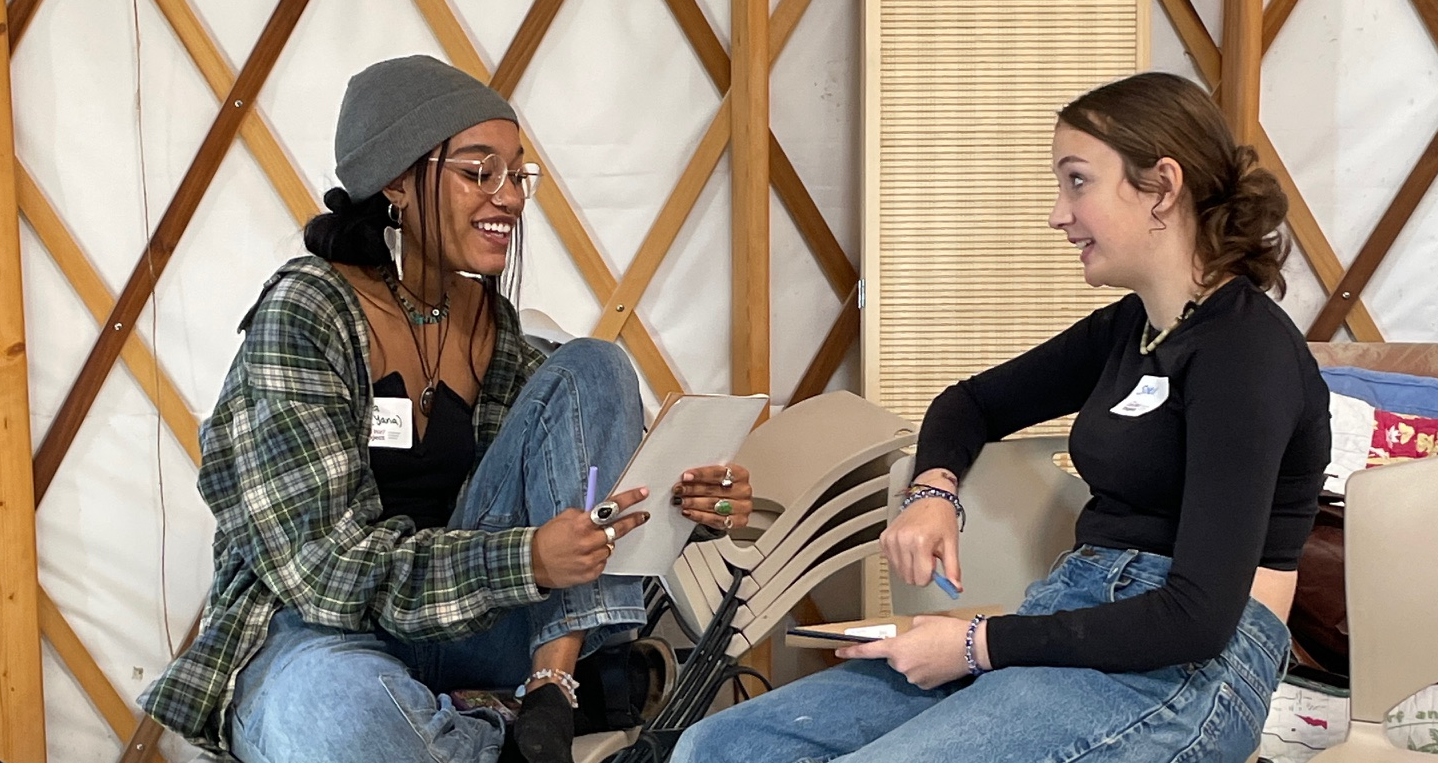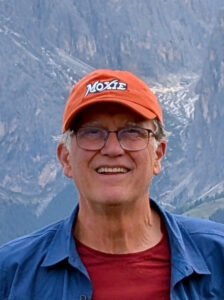
About Third Thought
Third Thought Initiatives for Civic Engagement was founded in 2019 in order to deepen and expand Waynflete’s community outreach initiatives, to unify our efforts to cultivate habits of mind and the skills of dialogue across difference, and to provide replicable models for civic engagement to schools with whom we partner.
Our team
 John Holdridge, Director of Third Thought Initiatives for Civic Engagement
John Holdridge, Director of Third Thought Initiatives for Civic Engagement
John Holdridge is the Director of Third Thought Initiatives for Civic Engagement and a lead facilitator for the Can We? Project. John has been an educator for 20+ years. Prior to that, his professional life included building things and performing. John’s work in education has always been focused on building community within and across schools and communities and encouraging students to find and express their authentic selves.

Patty Howells, Coordinator for the New England Youth Identity Summit
Patty Howells is the Coordinator for the New England Youth Identity Summit and a facilitator for the Can We? Project. In past lives, she has been a pastry chef, a civil rights investigator, a bicycle courier, a nutritionist, and a Peace Corps volunteer. Patty was a believer in NEYIS the moment she stepped into the very first Summit in 2016. To this day, she remains passionate about creating spaces large and small for student voices.
 Jake Posik, Director of Legislative Affairs at Maine Policy Institute
Jake Posik, Director of Legislative Affairs at Maine Policy Institute
Jake Posik is a lead facilitator for the Can We? Project and the Director of Legislative Affairs at Maine Policy Institute. In previous roles, he has served as Maine Policy’s Director of Communications, Policy Analyst, and Editor of The Maine Wire. Jake believes in the power of civil dialogue to bridge partisan divides and works to connect participating students with the Maine Legislature.
 Lowell Libby, Chair of the Third Thought Advisory Network
Lowell Libby, Chair of the Third Thought Advisory Network
Lowell was the Upper School Director at Waynflete for 30 years, during which time he helped to launch Third Thought and its various initiatives. Lowell’s ongoing commitment to Third Thought is an expression of his belief in the public purpose of private schools and his faith in the capacity of young people to wrestle with the most pressing issues of our times and set us on a path to a better future—when given the time, space, guidance, and encouragement to do so.
Our partners
Relationships are at the core of our work. Our collaboration with the following individuals, schools, and organizations allow us to do what we do together.
Partner organizations
In the earliest stages of the Can We? Project, we recognized that the majority of project organizers identified as left of center. In order to internally balance our work and to show a true commitment to honoring viewpoint diversity, we reached out to Maine Policy Institute (MPI). MPI’s executive director is a member of the Third Thought Advisory Network, and their director of legislative affairs has served as one of our lead facilitators since the 2021–22 school year and continues to provide expert knowledge on the workings of the Maine legislature.
Waynflete’s connection to Narrative 4 goes back to 2018, and the connection to the Can We? Project began in 2022 when we decided to use the story exchange model as a foundational activity to build trust and empathy among students in Can We? cohorts. Our Can We? facilitators are certified story exchange facilitators as are many of our Can We? school liaisons and students. Narrative 4 provides free story exchange facilitator training to our liaisons and student participants. They also provide an advisor to help schools implement the story exchange as a first step in developing a culture of dialogue.
Valo, an organization that works to support the emotional well-being of teens, has been our presenting partner for the New England Youth Identity Summit since 2022 and has provided financial support (as well as innumerable personnel hours) in the service of producing the Summit. Valo facilitators have been instrumental in helping us to lead the multi-school youth planning team, provide support for student workshop presenters, and prepare on the day of the event.
Can We? Project Partner Schools and Liaisons
Maine Academy of Natural Sciences (MeANS)
Piscataquis Community Secondary School
Third Thought Advisory Network
The Third Thought Advisory Network is dedicated to supporting Third Thought Initiatives for Civic Engagement. Members of the advisory network bring to the enterprise an array of backgrounds, life experiences, and political viewpoints, as well as connections in business, education, civic organizations, political parties, and government agencies. Read more
Our history
Third Thought Initiatives for Civic Engagement (Third Thought) is a natural outgrowth of Waynflete’s school culture. Founded in 1898 and shaped by the progressive educational philosophy of its day, Waynflete has been defined throughout its history by intellectual independence, strong interpersonal bonds, interactive pedagogy, and a commitment to serving the larger community. As the Upper School became more racially and ethnically diverse in the early 2000s, the school focused on creating more opportunities for students to learn from each other in dialogue. In 2016, noting the fraying social fabric in America, Waynflete launched the Dialogue Project, an effort to make engaging in productive dialogue across difference a keystone habit among Upper School students.
Also in 2016, Waynflete sought to share its focus on dialogue with the larger community by hosting the first New England Youth Identity Summit (NEYIS) in partnership with Maine Seeds of Peace. NEYIS featured student-led workshops on topics of importance to them, guest speakers, and performances. Nearly 300 high school students and educators from around Maine and New England attended. Impressed with the success of the first NEYIS, the Edward E. Ford Foundation awarded Waynflete a $50,000 grant to continue the work.
In 2018, bolstered by the success of NEYIS, Waynflete developed the Can We? Project (Can We?) in collaboration with a team of facilitators led by Deb Bicknell and with the support of the Maine Policy Heritage Center (now Maine Policy Institute) and generous donors. Students identified societal challenges of importance to them and sought to develop solutions that they later presented to candidates running for governor in Maine. That same year, Waynflete also started a collaboration with Narrative 4, a global organization of artists and writers, by bringing its story exchange to students and faculty at Waynflete. Both collaborations continue today.
In 2019, after the success of the initial Can We? Project retreat, the Edward E. Ford Foundation awarded Waynflete an Educational Leadership grant of $250,000 to launch The Third Thought Initiatives for Civic Engagement as a collection of public facing initiatives with a mission to:
- create, refine, and sustain a unique set of school-based initiatives that invite youth to reflect on their own experiences, learn from the perspectives of others, and take action on issues that matter to them, and
- share models for civic engagement that schools across the country may adopt.
The name Third Thought came from a student who was asked what she had learned from her Can We? experience. She said she had learned to say her third thought. When asked to clarify, she said that as an activist, her first response to hearing something with which she did not agree had been to lash out. Her second thought had been to justify why she was right in lashing out. But through her Can We? experience, she learned to take a deep breath and listen. By listening to others and reflecting on her own ideas, she was able to reach her “third thought,” a deepened understanding of both the topic at hand and how life experiences shape one’s beliefs, including her own.
The onslaught of the global pandemic in 2020 proved a significant disruption to Third Thought programming. The scheduled Sixth Annual NEYIS was canceled, as was a professional development workshop for educators and a third Can We? overnight retreat. To Waynflete Upper School students, however, the pandemic presented an opportunity. Realizing the emerging potential for online gatherings, they created a third initiative (the Perspective Project) with the goal of inviting speakers from across the country to share their perspectives and experiences in online sessions.
As with many organizations, the pandemic pause allowed Third Thought to reconsider, recommit, and (where necessary) redesign our core initiatives. The Can We? Project shifted to a school-based delivery which allowed it to reach 14 schools and nearly 300 students in the 2023–24 school year. The goal going forward is to build the capacity needed to broaden the Project’s reach by serving more schools and deepen its impact on the schools served beyond the participating cohort of students.
NEYIS began a new partnership with Valo. Valo, an organization that works to better the emotional well-being of teens, has become an essential presenting partner and recently helped us to welcome 300+ students and educators from across New England for the 8th annual Summit. The Perspective Project student leaders have also added in-person speaker visits that continue to welcome a range of life experiences and perspectives we can all learn from.
In 2022, Third Thought launched an ambitious five year fundraising initiative that will allow us to continue to develop and offer our programming to a growing number of students and schools.

